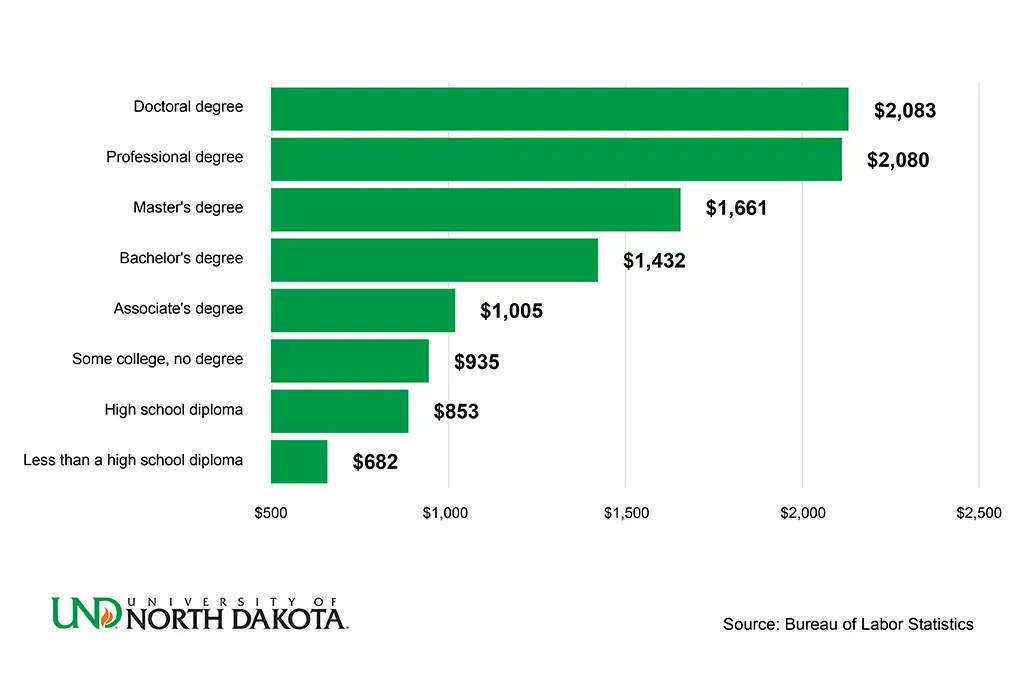
How Much Can You Earn With A Public Health Degree?
Reviewed by Ashley Bayne, MPH
With a public health degree, you can earn anywhere from around $40,000 to over $200,000 per year, depending on your education level, experience, and specific role.
Request Information
It feels impossible to put a price on healthcare—the work that helps save lives and improves the well-being of countless individuals. But while no salary can truly match the impact made, fair compensation is a solid start. According to the Bureau of Labor Statistics (BLS), the median annual wage for healthcare practitioners and technical occupations sits at $83,090.
Still, within healthcare, salaries can differ significantly based on the specific role. For example, a public health major salary won't be the same as that of a nurse or other healthcare professional.
North Dakota ranks among the top states where public health salaries surpass the national average, with professionals here earning 14.8% more than the national average.U.S. Bureau of Labor Statistics
Salary Outlook by Education Level in Public Health
Higher education generally provides specialized skills, knowledge, and qualifications that lead to more advanced roles and responsibilities, which in turn command higher salaries.
According to the BLS, there's a clear pattern in how education impacts earnings. Based on educational attainment, the median weekly earnings are:
- Doctoral degree: $2,083
- Professional degree: $2,080
- Master's degree: $1,661
- Bachelor's degree: $1,432
- Associate's degree: $1,005
- Some college, no degree: $935
- High school diploma: $853
- Less than a high school diploma: $682

As this data shows, the more advanced your education, the higher your earning potential. We see this pattern across all sectors, including public health, where the difference in pay between education levels can be large.
For instance, with a bachelor's degree in Public Health, the average salary is $79,657 per year, but it can rise to $127,500 depending on the role and experience. Moving up the education ladder, those with a master's degree in Public Health can expect an average salary of $120,688, with top earners making up to $169,500 annually. The average salary for those with a doctorate in public health is $118,081, but it can soar to as much as $237,000 for the most advanced positions.
Public Health Salaries Across Different Career Sectors
Public health majors have the advantage of working in many career sectors. This diversity of sectors leads to significant differences in responsibilities, work environments, and salaries.
Findings published in the American Journal of Public Health show that salaries across public health roles often differ significantly between state and local government versus the private sector. In some cases, government salaries are at least 5% lower compared to the private sector for 31 occupations, but for ten occupations, government salaries are at least 5% higher. Notably, certain management and leadership roles in the public sector see large disparities, with salaries up to 47% lower than their private-sector counterparts.
For example, chief executives and operations research analysts earn up to 46.9% and 35.6% less, respectively, in government jobs. Epidemiologists working in state and local government may also see salaries dip by up to 25% compared to private industry.
These differences are usually due to budget constraints and lower competition, while industries like healthcare, manufacturing, and finance offer higher wages due to demand and specialization.
However, some government roles, especially in social and human services, offer better pay than the private sector. Social and community service managers can earn up to 38.7% more, and substance use counselors can see salary increases of up to 27%. These roles often benefit from government funding focused on improving public welfare.
Non-salary Benefits in Public Health Careers
While salary is an important consideration in public health careers, the non-salary benefits can be just as valuable, particularly in government jobs. Public health professionals working in federal or state agencies often enjoy generous health, dental, and vision insurance, typically with a large portion of the premiums covered by their employer. Many government roles offer access to excellent retirement plans, like the Federal Employees Retirement System (FERS), which includes pensions, Social Security, and a 401(k)-style savings plan with matching contributions.
In addition to these benefits, public health professionals often have access to student loan forgiveness programs, and many public health jobs provide ample paid leave along with flexible work schedules and telework options to support a healthy work-life balance.
When it comes to the private sector, the benefits can vary greatly based on the employer and their policies.
Still, even with all these tangible benefits, public health careers offer the profound non-monetary reward of job fulfillment. Many professionals in this field report a deep sense of purpose and satisfaction from working on initiatives that improve public health, enhance community well-being, and, ultimately, save lives.
How to Increase Your Salary in Public Health
To increase your salary in public health, first and foremost, continue your education. Obtaining a master's or doctorate in public health can boost your earning potential. Many higher-level roles require advanced degrees, and these jobs tend to offer higher salaries.
Second, consider gaining specialized skills. Public health is quite a broad field, and professionals with specialized expertise, such as biostatistics or data analytics, are in high demand. These specialized roles often come with higher pay due to the technical skills required.
You can also seek leadership roles within your organization. Moving into management positions, such as health services manager or director of public health programs, typically comes with increased responsibilities and a significant salary bump. Building strong leadership skills and proving your ability to manage teams and projects can position you for these opportunities.
Networking and staying current in the field are also crucial. Join professional organizations, attend conferences, and subscribe to public health journals to keep up with the latest trends. This helps you stay competitive and aware of new opportunities for career growth.

Why Pursue a Career in Public Health?
A career in public health means being part of a profession that allows you to have a meaningful, positive impact on the world. While competitive salaries are a draw, particularly in specialized roles or regions, the deeper motivations for many public health professionals are rooted in the desire to improve lives.
You could be working to prevent disease outbreaks, designing health education programs, advocating for policy changes, or doing something else and actively contributing to society's well-being. This sense of purpose and the knowledge that your work has the potential to save lives and improve health outcomes is a powerful motivator.
For UND alumni Alison Traynor, the most fulfilling aspect of her work is seeing the life-changing impact on individuals.
Getting a call from somebody who says, 'Because of the work that you do and the work that your coalition is doing, I got better.' There is nothing greater than that.Alison TraynorUND Alumni
For those motivated by the desire to serve, the emotional rewards of public health can be just as compelling as the financial benefits. In this field, you can wake up every day knowing that your work makes a difference, offering both personal fulfillment and professional satisfaction.
Conclusion
The bottom line is that public health careers balance competitive salaries and a deep sense of purpose. While financial rewards are significant, particularly in specialized roles, the real value lies in the ability to create lasting change and improve the health of communities.
At UND, we offer a range of degrees—from undergraduate to master's programs, a JD/MPH dual degree, and even Public Health certificates—designed to prepare you for this career choice.
Just like Alison Traynor, who found her calling in public health and saw her skills transform at UND, you, too, can prepare for a meaningful career in this impactful field. As Traynor herself said, "I would be hard-pressed to find a way that it [UND] has not helped me grow my skills." Here, we empower you to become the voice of change, the leader of transformation, and the force that brings health and hope to those who need it most.
FAQs
Biostatisticians, epidemiologists, and health services managers are among the highest-paying public health jobs, with salaries often exceeding $100,000 annually.
The top five states offering the highest salaries for public health professionals are Oregon, Alaska, North Dakota, Massachusetts, and Hawaii.

Ashley Bayne, MPH
Ashley Bayne serves as Assistant Director of the Public Health Program at the University of North Dakota School of Medicine & Health Sciences. She helped graduate students forge their paths in public health for over ten years. An experienced advisor and advocate for students and staff, Ashley become known for her ability to help others identify and achieve their passions. Ashley led university COVID-19 contact tracing efforts, mentored in the staff mentoring program, served as a board member of the Live Well Grand Cities health coalition, and managed teams in a variety of community-based projects. In addition to her primary position, she serves the field of public health through various university and community activities. Before her position at UND, Ashley held roles at Oregon Health & Science University, Rede Group, and the Oregon Health Authority.
Ashley earned a Master of Public Health degree from Oregon State University and bachelor's degrees in Community Health and Exercise Science from Concordia College in Moorhead, Minnesota.